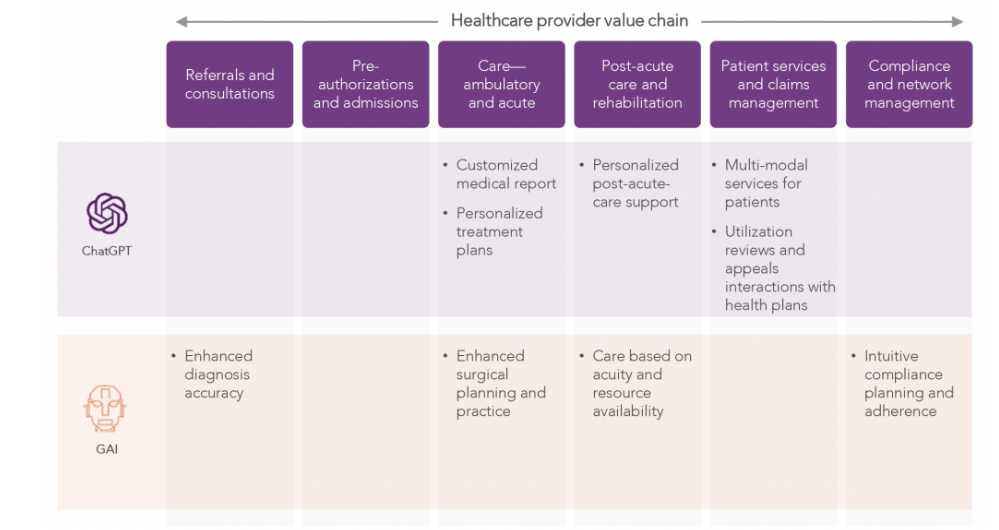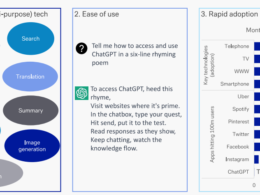the health strategist
institute for research and strategy
in value based health, care and tech — transformation
Joaquim Cardoso MSc
Chief Researcher & Editor of the Site
April 9, 2023
ONE PAGE SUMMARY
The article discusses the limited capabilities of ChatGPT, a natural language processing application developed by OpenAI, in healthcare.
- It suggests that enterprises should focus on building new generation products and services based on generative AI (GAI) which has broader capabilities.
- While ChatGPT has tactical use cases that help with efficiencies, GAI has the potential for real transformation in healthcare.
- GAI use cases are relatively sustainable and have the power to enhance surgical planning and execution and reduce manual interventions in administrative tasks.
The article also highlights six companies using ChatGPT in interesting ways to connect with healthcare stakeholders.
- It suggests that success with GAI will be sustainable, disrupt legacy, and make way for better healthcare to be delivered and consumed.
SELECTED IMAGE(S)
Exhibit 2: Health systems and hospitals appear to be able to leverage ChatGPT tactically, but the real difference is with GAI

DEEP DIVE

Don’t let ChatGPT distract from the value of generative AI in healthcare [excerpt]
HFS research
Rohan Kulkarni
Practice Leader — Healthcare and Life Sciences
April 4, 2023
ChatGPT applications in healthcare are few and far between, addressing transactional activities that solve annoyances rather than anything meaningful or strategic (see Exhibits 1 and 2).
Health plans and healthcare providers (HCPs) must therefore exercise caution applying ChatGPT.
They should use the energy of the moment to refine and accelerate their roadmaps to build new generation products and services based on generative AI (GAI), which is broader in its capabilities.
Spending calories on ChatGPT will be wasted as the technology matures, newer modalities become real, and adoption increases. Instead, enterprises should start piloting features to enable users to use GAI with enterprise governance.
Spending calories on ChatGPT will be wasted as the technology matures, newer modalities become real, and adoption increases. Instead, enterprises should start piloting features to enable users to use GAI with enterprise governance.
ChatGPT, a natural language processing application developed by OpenAI and powered by generative large language models (LLMs), was launched in November 2022.
It created a significant buzz, forcing Big Tech to accelerate AI plans and excited consumers to use it for interesting purposes, including generating code, writing book reports, penning love letters, and authoring legal responses.
It even passed the US medical licensing exam, but it remains inconsistent, unreliable, and tends to hallucinate.
OTHER SECTIONS
Refer to the long version of the publication (link below)
The Bottom Line:
Leverage the excitement of ChatGPT.
Craft a practical roadmap of embedding GAI to drive disruptive innovation that meets the needs of the next generation of health consumers.
The excitement of ChatGPT will die down, driven by the improving sophistication of GAI and the lack of sufficient use cases.
While that is not news, enterprises must continue to refine their GAI plans, invest wisely, and reengineer their processes to improve adoption as they drive to better outcomes across the triple aim of care — reducing the cost of care, improving health outcomes, and enhancing the experience of care.
The excitement of ChatGPT will die down, driven by the improving sophistication of GAI and the lack of sufficient use cases.
Originally published at https://www.hfsresearch.com












